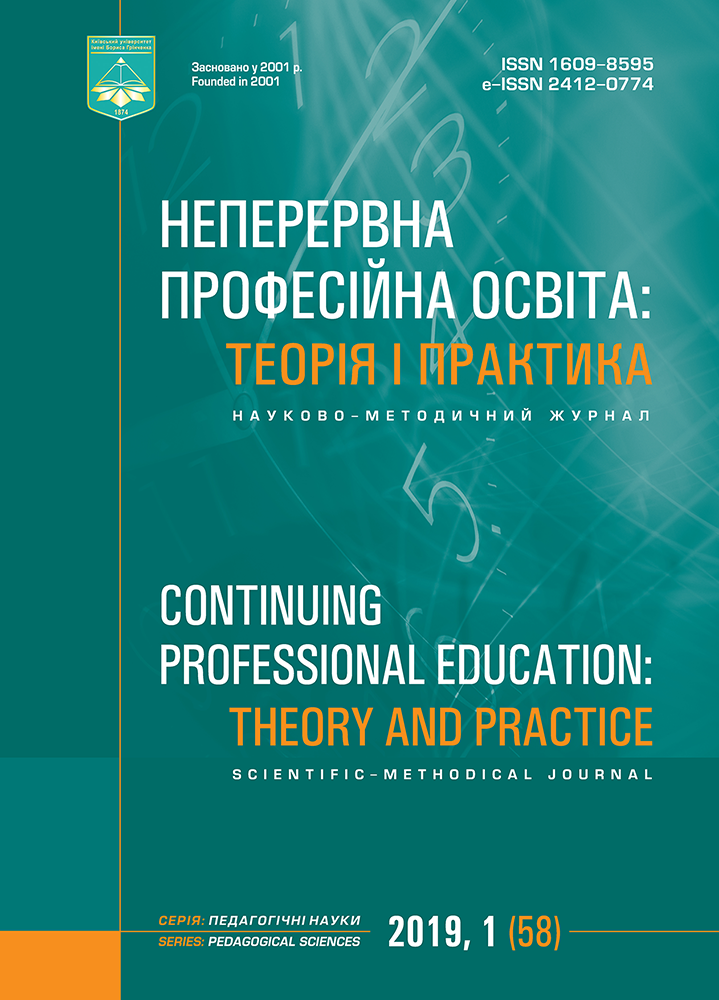PREPARING STUDENTS FOR LEADERSHIP: THE ROLE OF UNIVERSITIES
DOI:
https://doi.org/10.28925/1609-8595.2019.1.510Keywords:
teachers, leadership-service, students, university.Abstract
The article is devoted to the role of universities in preparing students for leadership. The article states that universities provide opportunities that cultivate the leadership potential of their students, but rarely offer specific guidance for future leaders. The article highlights the experience of Co-Serve International, a non-governmental organization based in the USA, has realized over the past fifteen years in preparing future leaders. The methodology and the principles of CoServe International have been taken by partners to the USA, Kazakhstan, Ukraine, Thailand, Afghanistan, the Philippines and Nigeria. Co-Serve has learned that developing leaders is best achieved by non-traditional teaching methods, such as «action and reflection». Ten Ways Professors Can Model Leadership have been substantiated in the article: an example of leaders in their field of study; cultivatіоn of students self-awareness; respect for personality; a model of teachers’ behaviour as a leadership-service for students; active listening as an act of service; helping students to find their purpose and achieve it; building community as an act of leadership; conflict resolution and development of the skills of forgiveness; creating an atmosphere of trust in the learning community; encouraging students who have achieved certain results.References
Bellah, R. N., et. al. (1985). Habits of the Heart: Individualism and Commitment in American Life. Berkeley, USA: University of California Press (eng).
Boyer, E. L. (1987). College: The Undergraduate Experience in America. New York, USA: Harper and Row (eng).
Brooks, D. (2015). The Road to Character. New York, USA: Random House (eng).
Covey, S. (2006). The Speed of Trust: The One Thing That Changes Everything. New York, USA: Free Press (eng).
Dostoevsky, F. M. (1966). Crime and Punishment. Washington, USA: Washington Square Press (eng).
Ferguson, C. & Duin S. (2012). Indomitable Spirit: Life-Changing Lessons in Leadership. Portland, USA: GISI Marketing Group, Publishers (eng).
Greenleaf, R. K. (2008). The Servant as Leader. Atlanta, USA: The Greenleaf Center for Servant Leadership (eng).
Hunter, J. C. (1998). The Servant: A Simple Story About the True Essence of Leadership. New York, USA: Penguin Random House (eng).
Lencinoni, P. (2004). The Five Dysfunctions of a Team: A Leadership Fable. San Francisco, USA: Jossey-Bass (eng).
McGrath, E. J. (1976). General Education and the Plight of Modern Man. Indianapolis, USA: The Lilly Endowment (eng).
Makarenko, A. S. (2001). The Road to Life: An Epic of Education. Vol. 1. Oregon, USA: University Press of the Pacific (eng).
Nohria, N. & Rakesh, Kh. (Eds.) (2010). Handbook of Leadership Theory and Practice. Brighton, MA, USA: Harvard Business Press (eng).
Principles of Servant Leadership: A 20-session course for global classrooms: Facilitator’s Guide (2013). Sandy, OR, USA: Co-Serve International (eng).
Swenson, R. A. (1999). Hurtling Toward Oblivion: A Logical Argument for the End of the Age. Colorado Springs, USA: Navpress Pub Group (eng).
Downloads
How to Cite
Issue
Section
License
Copyright (c) 2020 Marshall Christensen

This work is licensed under a Creative Commons Attribution-NonCommercial 3.0 Unported License.



